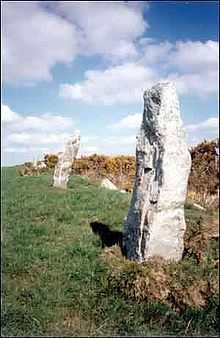Nine Maidens stone row

Nine Maidens stone row is an ancient monument in the parish of St Columb Major, Cornwall, England.
The Nine Maidens (grid reference SW936675) are also known in Cornish as Naw-voz, or Naw-whoors meaning The nine sisters .[1] This late neolithic stone row is located 2 miles (3 km) to the north of the town of St Columb Major.
Site description
The row comprises nine stone megaliths and is situated in a field alongside the A39 between St Columb Major and Wadebridge. The row is approximately 262 feet (80 m) in length, with stones varying in height from 2 to 6 feet (0.6 - 2 metres). The stones are irregularly spaced and aligned in a north easterly direction. They are aligned towards a stone known as the Fiddler which stands approximately 800 yards (730 m) away. It has been suggested by William Collings Lukis that at one time the row may have originally extended to the fiddler.[2]
Interpretation
The standard interpretation of prehistoric rows is that they were used for ritual purposes, and the same applies to the Nine Maidens. This interpretation is based on lack of evidence for more mundane activities. That the stones are placed along one of the cardinal points of the compass might also suggest an astronomical or calendar function, perhaps relating to the agricultural year. There are no other rows of this type in Cornwall .
Myth and legend
The local myth about the creation of the stones suggests that nine maidens were turned into stone as punishment for dancing on a Sunday. The fiddler, a megalith some distance north of the row, is said to be the petrified remains of the musician who played for the dancers. These petrifaction legends are often associated with stone circles, and is reflected in the folk names of some of the nearby sites, for example, The Hurlers and The Pipers on Bodmin Moor. It is likely that these tales were encouraged by the early Christian Church to prevent old pagan habits continuing at the sites.
The stone row was first noted by historian Richard Carew in 1605. He said:-
Wade bridge delivereth you into waste ground, where 9 long and great stones called The sisters stand in a ranke together, and seem to have been so pitched, for continuing the memory of somewhat, whose notice is yet envied us by time.[3]
The stones were the inspiration for the Celtic opera Iernuin by British composer George Lloyd. The opera, first performed in 1934 at the Pavilion in Penzance, tells the story of one of the Maidens who comes back to life as a fairy.[4]
References
- ↑ Popular Romances of the West of England: Romances of the Rocks: The Dancing Stones, the Hurlers &c
- ↑ StoneHenge And Other British Monuments Astonomically Considered By Joseph Norman Lockyer
- ↑ Richard Carew's Survey of Cornwall (1605)
- ↑ "George LLoyd - Composer". cornwalls.co.uk. Retrieved 24 June 2013.
External links
- Nine Maidens On The Modern Antiquarian website.
- Nine Maidens On The Megalithic Portal website.
- Horizontal photograph of the Nine Maidens